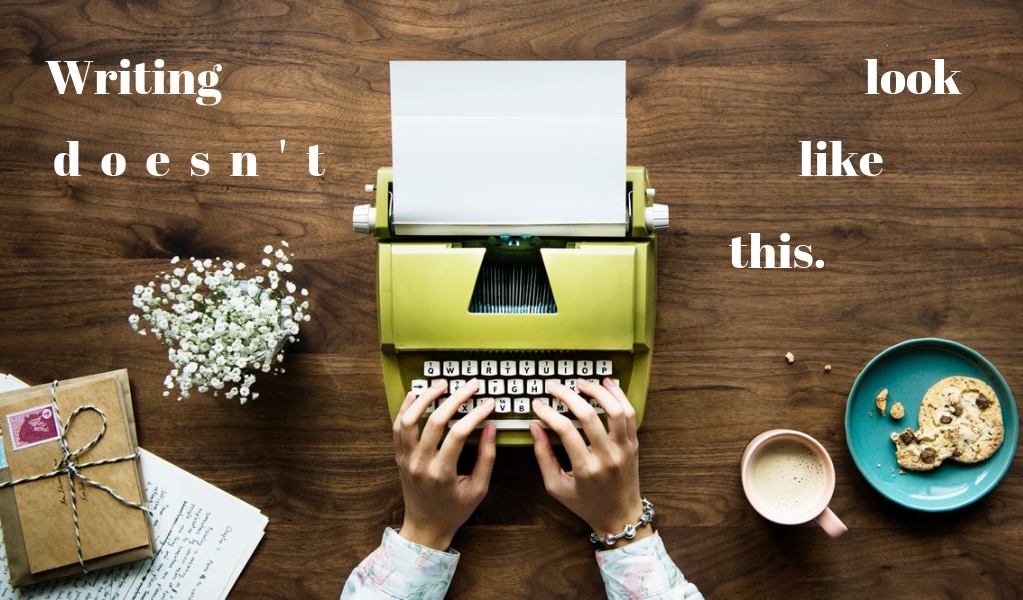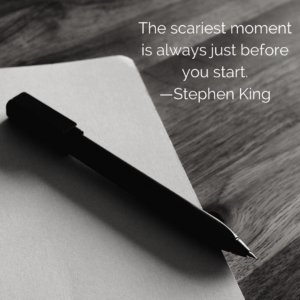
After neglecting it for months, I promised myself I would start posting to my blog once a week. My first post was just over a week ago on Saturday, so I haven’t exactly achieved my goal yet. At least it’s progress. (I’ve been told I need to focus more on small wins instead of focusing on how I fuck everything up. Not sure I’m doing it right, but I’ll keep trying.) The thing is, I don’t have a plan for what I want to say to you today. I just know I promised to write, so I’m writing.
Maybe that’s how it has to start. You sit your ass in a chair and write even when you don’t have anything it say. Of course that’s how it has to start. I know this. I have a damn Ph.D. in writing studies. Writing is a process of discovering what we have to say, not a delivery method. The final published work might be about delivering our completed message, but the process of creating that message—the actual work of writing—is knowledge production. We know more after we have written, even for just five minutes, than we did before we started. Even when we sit down with a clear plan for what we want to write, the process changes things. It’s fascinating to watch this process unfold with an author who’s working on a novel. Characters they thought were villains unexpectedly reveal themselves to be heroes. A coward turns out to be the bravest one in the story. No matter how much they plan and storyboard, fiction writers can never be sure how a story will end until they write the last word.
Fiction writers don’t invent their characters—they get to know them through the writing process. When we write about a nonfiction topic, we learn as much through the act of writing as we do through the research process. When we write about ourselves, we get to learn who we are. But that process is unsettling to say the least. We aren’t fictional characters after all, and realizing that maybe we don’t know everything about ourselves is downright scary. And the fact that we are sharing our recent self-discoveries with a public audience brings the fear level from “damn scary” to “fucking terrifying.” When I hit publish on my previous post about my struggle with anxiety and OCD, I felt like I was standing naked in the middle of the busiest street in town with TV cameras and cellphones pointed at me. In reality, maybe 100 people even bothered to look twice at that post, and most of them were friends and family (hi mom!), so my fears might have been a bit exaggerated. But it doesn’t matter. In my head the fear is real. It makes me feel alone in this world, and more often than not, it stops me from writing.
I don’t want to be alone in this process. I want you to come along with me so it doesn’t seem so scary. The romantic notion of the writer alone in her ivory tower is a myth that holds us back. Writing happens in communion with others. Sure, you have to sit down with pen or keyboard each day and put words on a page, and that has to be done alone. But what happens before, after, and in-between the writing requires people.
I would never have finished my dissertation if it weren’t for a friend who invited me to her house in Michigan for a weekend. She provided another friend who was struggling to finish and me with rooms of our own. We spent the morning writing with our doors closed. At lunchtime we came downstairs to a wonderful meal she had prepared for us. We ate and got some exercise while she read our drafts and provided feedback. We then went back upstairs to revise before heading out to dinner together. We did this for two days. I wrote about a third of my dissertation that weekend after struggling for almost a year to write more than a few good pages. At the time it seemed like magic, but the magic was simply doing the work in the company of other writers and friends who supported and believed in me. When I quit my academic job and decided to start writing memoir and creative nonfiction, I knew I would need that sort of support again, which is why I jumped at the chance to join Janelle Hanchett’s first Renegade Writers group. We’ve had two face-to-face retreats now, and both have been magical.
Obviously, it’s not possible to go on a writing retreat every weekend. (Who would do that laundry I’m always bitching about?) But it doesn’t mean we are doomed to struggle alone either. I’ve found that something amazing happens when we share our writing process with others. We realize we are not alone. Friends and family I would never have suspected of having any interest in writing confess that they too want to write a novel, a memoir, or start a blog. They too thought they were alone, that sitting down to write was scary because they didn’t know what to say and were afraid to show it to anyone, that everything they tried to write turned out a hot mess, and what difference did it make anyway because they would never have the time to be a “real” writer. This is the bullshit we say to ourselves when we try to write in secret. I wouldn’t be writing at all if I didn’t know I had you to read it—even if “you” is sometimes only my friend Jill and my fellow Renegade writers.
I stopped writing when I stopped reaching out and sharing with my writing community. Once I started getting outside my own head, my writing fears didn’t go away, but they stopped controlling my process. My fears became something I could lift and set aside for a precious moment instead of a crushing weight on my chest. Over the next month I’ll be sharing more of my writing process here and on social media. It’s going to be a weird ride, but I’m ready for it. It’s time.

 About a month ago I went to hear a friend speak at Fort Collins Startup Week, a conference by and for local entrepreneurs. Her presentation on how to sell your services without feeling like a smarmy jackass (not her actual title) was affirming and encouraging. I left feeling confident and ready to tackle the day. So why 10 minutes later when I pulled up in front of my house did I stay slouched down inside my parked car like a getaway driver looking for cover? I sat there scrolling through Facebook on my phone like it was my damned job.
About a month ago I went to hear a friend speak at Fort Collins Startup Week, a conference by and for local entrepreneurs. Her presentation on how to sell your services without feeling like a smarmy jackass (not her actual title) was affirming and encouraging. I left feeling confident and ready to tackle the day. So why 10 minutes later when I pulled up in front of my house did I stay slouched down inside my parked car like a getaway driver looking for cover? I sat there scrolling through Facebook on my phone like it was my damned job.